#your a pastors kid in a small village so like you understand livestock and you think you understand God and His plan
Explore tagged Tumblr posts
Note
📂
USELESS HEADCANON
In my superhero verse Arawn is uneasy using his powers. Because unlike in his DND verse he doesn't understand where his powers come from and why he has them. And he's the type of person who has to understand every detail of a thing before he can be relaxed enough to use it, so having an innate part of him that he just completely can't comprehend really freaks him out.
#a boy in flames // musings#i mean like imagine you're pretty secure in your worldview and your place in it#your a pastors kid in a small village so like you understand livestock and you think you understand God and His plan#and then you wake up with healing powers??? and fire???? that you can just summon??#i'd freak out too
0 notes
Text
Solomon is set up to be a trustworthy and reliable character. He is gracious when Sarah gives him a piglet, he warns her to be careful in the woods (or is he just worried she’ll catch him; if he knows about the parties, then he probably knows they visit Widow Mary, hm…). He is kind and understanding when she tells him she loves Hannah, he is protective when Pastor Miller tries to kill her in the chapel. He tries to talk sense into the other townspeople. He seems like a genuinely good man. But he’s not, and when I did my rewatch, I looked at his words and actions through that lens instead.
It's fairly self-evident that he’s selfish and cares about others only insofar as they can be of use to him, but knowing what he is from the start allows for some interesting reads.
First, this exchange right at the end with Sarah; the tinting of my lens:
Solomon: “Consider, Sarah, a single soul,” (Cyrus Miller) “Just one. And in return, what no amount of praying could ever bring. One person every few years seems a small price to pay.”
Sarah: “One person? The pastor slew twelve children.”
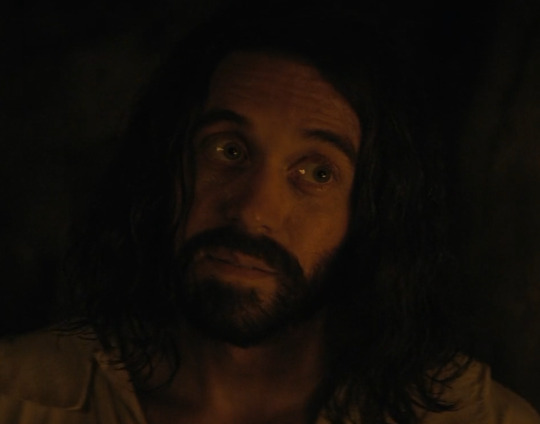
Solomon considers one person to have been sacrificed. Sarah argues it was thirteen. Both of them leave out poor Widow Mary, a total of fourteen people. Neither of them mentions the other costs: the divisions and suspicion it sows in their community, the dead livestock and the toll that will take on a small village’s food supply, or the potentially unending casualties this will have going forward. Obviously, given the situation and how shocking this is to both of them, I’m willing to put aside these things. Heat of the moment and all that. And Solomon expects there will BE no consequences in the vein of poor harvests and such.
What I really want to emphasise here is this: Solomon views his only victim as being Cyrus Miller, Sarah considers all of them to be his victims. This is interesting because it highlights not only the completely askew moral compass Solomon is working with (and I mean, yikes, you know), but also how he views women. Again, this is an “at the time” thing that I’m mostly willing to wave off as being pretty standard. Men did see women as less than at the time so it makes sense that he’s not really visualising Widow Mary (who had a Reputation for being a bit of a weirdo anyway) as a Victim Who Mattered. Children were also, generally speaking, a woman’s concern. He shows no remorse at all for the children being killed; the children who would’ve been Union’s future. And he WAS a father. We never find out how his wife and child died (or maybe I’m just not sure I believe his story), but I’d be very curious to know if this is his first foray into the occult or if perhaps he had previous victims. A trial run or some such.
HOWEVER. This idea of Solomon not actually giving much of a shit about women got me thinking about another scene from earlier in the movie (and this is where I really started to re-evaluate his actions based on new knowledge).
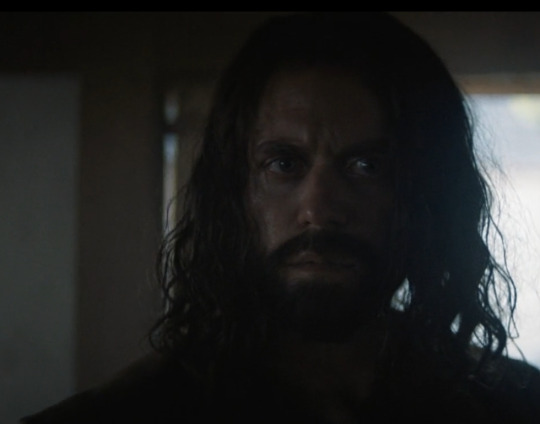
This is Solomon upon entering the chapel where Cyrus has just murdered a dozen kids. You can see in his expression and movements that he’s unsure what to expect; he doesn’t know what he’ll find in here. He clearly knew there would be SOME effect on poor old Pastor Miller, but my guess is he just assumed the man would die horribly and that’d be that. So imagine being Solomon here and having to confront what you’ve REALLY done.
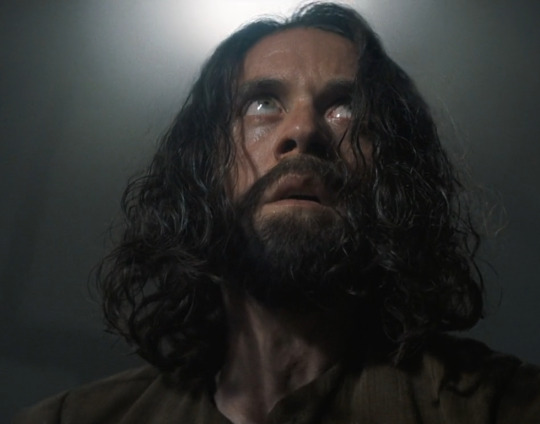
This is the shot where he fully comprehends what’s happened. The horror on his face. He was not expecting this. Something bad, yes. Gouging out kids’ eyes? Not so much. (There’s a slightly zoomed out shot of Solomon on his knees just after this and it’s great, it’s like here you are Solomon. Behold the consequences of your actions. And he’s sitting among all these dead children, we as the audience are getting a moment to fully take in the horror of what’s just happened, but HE is taking this moment for it all to sink in. In this moment, he’s got to be wondering “Is this really worth it?” and I wonder what kinds of things he’s weighing up in his head. I wonder what would’ve happened, what he would’ve decided later, if Sarah hadn’t stumbled onto his secret and condemned him for it. Anyway.) Please also note the lighting behind him: not an accident, he is literally being posed here as a saviour of some kind, a vengeful angel, perhaps. We are being positioned to see him as the guy who will Do Something about all this, starting with Cyrus Miller we must assume. Very good framing in the “don’t let the audience figure out he’s the bad guy” kinda way. But wait up a minute.
The townsfolk spill in the doorway, they find the children relevant to them and have a horrified moment and then there's Sarah in the front row. The pastor comes around the stand with the clear intent to kill her, and Solomon has a moment. He knows what’s gotta be coming, he has to know, there’s this anger in his face, and he calls out to Sarah as a warning. Goody Miller says, “Cyrus no!” and then Solomon impales him. No hesitation. This is a man beholding his works and being very conflicted about them.
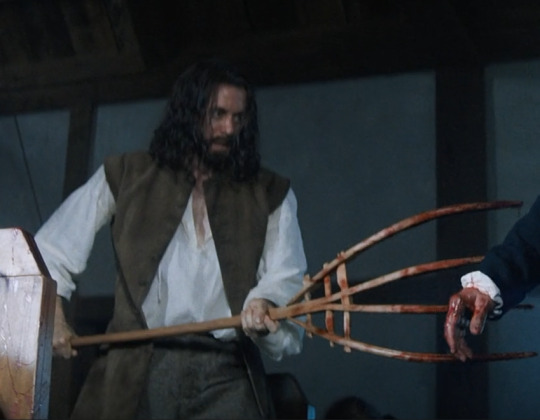
What’s interesting to me is that the first time you watch this scene it is VERY easy to say that he does this to protect Sarah whom he has feelings for. Super easy. It’s set up right from the start with Sarah’s conversation with her dad and her lil visit out to see Solomon and their friendly banter. It’s established and it’s understandable. The contrast is between Solomon and literally everyone else in the room, however.
The townsfolk with children come charging in to find out what’s gone on and they all go right to their children because they love their kids/siblings obviously and want to look after them. Goody Miller’s instinct is to go to her possessed, murdering husband because she CARES for him. But Solomon does not go to Sarah. He stands there, staring at Cyrus and that’s it. He doesn’t even LOOK at Sarah. Why not? He’s supposed to care about her? But does he? Does he value her at all outside her potential as a wife?
Now, Solomon is obviously Going Through It, here. He did a thing, it escalated WAAAAY beyond his expectations, and now he has to wrestle with that. He has to decide is all this worth it? Does he care so little about people that’ll he’ll do it again?
This is largely the scene I was considering. But there are other little changes to a reading of Solomon. Such as when Sarah tells him she loves Hannah, which she did right before this scene in the chapel. Here’s his expression:
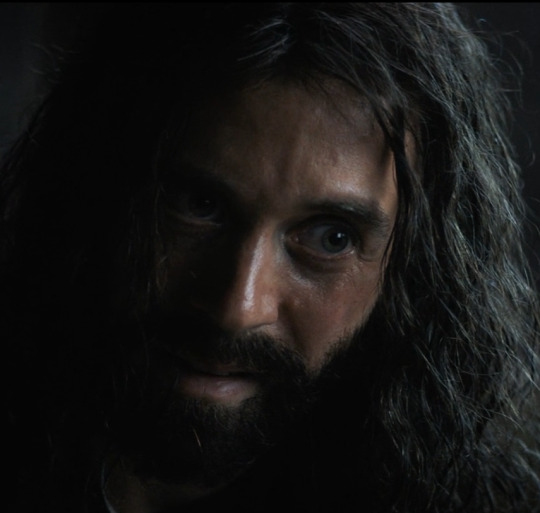
This is Solomon’s face when Sarah says, “And if it wasn’t? […] That’s why I’m so afraid, because it was not just a dalliance.” That is the face of a man whose grand plans are crumbling. On a first watch, it's the face of a man hearing something he's not expecting to, something he might find a little distasteful about a person he cares for and respects. On a rewatch?
He KNOWS that she and Hannah have been having a lil thing going on, he SAW them in the woods. But he’s clearly decided that it doesn’t matter, he’s got his own reading of the situation happening in his head and it goes like this: a woman loves a man, they get married, they have kids, there are no deviations from this; if there ARE deviations, they are just… practice for the real thing, nbd. Therefore: Sarah will love Solomon, they will get married, have kids, all will be well and as people expect. So when Sarah very much has no intention of going along with this view… he’s got to be wondering how it’ll work with his devil plans. He MUST have this niggling doubt in his mind that she's even worth including in his master plan. And when he saves her in the chapel but never so much as looks at her? He has a decision to make, there.
And it makes ME wonder: how much did he ever really care about Sarah? Did he love her? Or did he just love the idea of having another wife? A take-two at being a family? Did he love the idea of proving his brother (and the town) wrong and being a hero with a thriving farm and a quaint lil family? Because he turns on Sarah easily enough, he chooses the devil pact over her and the other townsfolk. He chooses not to live his life but to end others. (Solomon Goode has two hands and he's making that everyone elses' problem.)
So when he’s standing in the chapel over the body of Cyrus Miller (his one and only victim, we PROMISE), what’s he really thinking? Yes, more than one person has died. No, that doesn’t have to put a dent in his plans. Perhaps Sarah can still come around. Is he considering how to get rid of Hannah? Is he wondering if Sarah is worth it? She’s a very strong personality (she is no lamb, after all), it’s not like she’d let him go about his business without any questions, she’d stick her nose in everywhere, maybe find him out. Is that risk worth it?
Solomon actually says when they’re wrestling at the end, “Don’t make me hurt you, I love you, Sarah.” And it’s the ‘don’t make me hurt you’ that’s so typical of men like him. He doesn’t love her, he loves the idea of her, the idea of what she could give him or be for him. He's a man who lost his wife and child and he feels that keenly; a failure or absence in his manhood. So his faults and shortcomings become her problem. Any woman could be substituted and as long as they were malleable and suggestive enough, it’s all the same to him. Which is clearly the conclusion he eventually arrives at since he turns on her and she hangs.
Should Sarah have figured out he was untrustworthy and insane earlier? No. I don't think so. It's not like Solomon was waving red flags around everywhere. He seemed like a normal dude on the surface, definitely pretty great in comparison to Thomas or Caleb, which is what makes him so dangerous. It is interesting to watch again knowing the truth, though. The things that make your hackles go up with more context, the subtle hidden meanings in his words, the way everything he does is for himself, it's a very nice reframing.
Sarah’s final line also drives me absolutely insane: “I will never let you go.” She didn’t want anything to do with him, but now? When it ends like this? When he’s decided she’s not worth it and he doesn’t want her after all? When he's taken away her chance at happiness? When he's ripped all the solid ground out from under her? That’s when she says she’ll never let him go? And that word choice? It's not 'I'll never let you forget this' or 'I'll never let you rest' or something more like that, it's 'never let you go' she'll hold onto him forever. He's made his issues other people's problems and now she's making herself HIS problem. Taste of his own medicine. Never let him go. Vicious, outrageous, iconic. I love her.
Everything is about HIM, and he uses all the tools at his disposal to make sure things come up Solomon. He chooses himself every time. A great juxtaposition to Sarah who chooses Hannah every time (even when Hannah tells her to run and she does, Sarah still goes back. It's a stupid decision, monumentally dangerous, but she wants to help Hannah, she goes back because she CARES). And I think the really great part is that to everyone else in the town, it looked like Sarah was just being a bitch, but she made her choices with the goal of protecting people; she tried to protect everyone in Union – Hannah, foremost, sure – but even that is a selfless act. She knew it was one or both of them so she saved Hannah. Solomon knew it was him or like… hundreds of people. And he chose himself. Would love to know what Hannah did after this, we don’t see another Miller in ’78 or ’94 so like, where’d she go? (The answer is probably ‘got married, took her husband’s name, no more Millers’ but like, c’mon, something more interesting please.)
And listen, I know Solomon must’ve gotten married again and had more kids, that’s obvious enough; and we know he kept going with the rituals, but I BET he pictured himself as the poor, sad, unsung hero of Union, doing this for the Good Of Everyone™ and having to live with the suffering in silence. I bet he thought he was living a miserable life because it didn't turn out EXACTLY how he wanted. Because he had to justify it to himself somehow, and it started with his ‘these lands are fertile’ so he’s got this picture of himself in his head where he’s solving everyone’s food problems as if he didn’t cause them in the first place.
He’s the very epitome of “be careful what you wish for” because he wished for Sarah Fier and by god he got her, teeth and all.
#fear street#personal#analysis#this is nonsense i'm so tired#but i've been thinking about sarah fier again#(sorry i mean i'm thinking about her STILL)#and yeah i rewatched the movies#with the extra context solomon is a completely different character#nick too#esp in 1978#but sarah fier is my rotisserie character so like#you get what you get#wish i knew how to make gifs#the stills are fine but they don't do my Vision justice you feel
15 notes
·
View notes
Text
Opinion: A story of grossly mistaken identity
Ali bhai (my field assistant) and I were doing fieldwork around the Berdo village of western India in October. Part of a larger arid grassland and pastoral landscape (called Banni), Berdo is about 80 kilometres from our field station. Back in 2014, Berdo was also slightly off our regular fieldwork haunts.
We (rather I) were trying to understand how the vegetation changes with livestock grazing intensity. Ali bhai was more curious about why I would bother to travel all the way to the harsh environment of Banni, just to count how many individuals of different grass and herb species were present in 1x1metre quadrats, that too for a salary as meagre as mine.
I can’t disagree that fieldwork can sometimes be tedious and painstaking and the weather unkind. Especially when temperatures soar close to 50oC. But who can resist the sheer beauty of vast grassy flatlands, stretching as far as the eye can see. Dotted with trees and shrubs, home to peculiar wildlife, and shaped through historical times by climate and pastoral communities, this landscape has never ceased to amaze me.
Communicating my awe for the land to Ali bhai was sometimes challenging. This is where he spent most of his life and thus the ‘novelty index’ scaled slightly on the lower side for him.
With no witty come back to his curious ponderings, I would often encourage Ali bhai to set aside his questions for our lunch breaks. We had no time to spare - in arid landscapes the window for collecting herbaceous vegetation data is short. Post-monsoon, grasses begin to dry out fairly rapidly and telling one grass species apart from another becomes challenging.
This is a story of one such fieldwork day near Berdo; only this was a rather atypical one.
Our Bolero Camper 4x4 was loaded with all the gear we needed for the day- a hand-held GPS, our 1x1meter gridded metal frame, a rope and measuring tape to record grass height, a hammer and metal pipe marked at 15cm depth for digging out soil cores. With the inventory tallied and items ticked off our checklist, we were good to go.
Target for the day – collect vegetation data and soil cores at 9 locations.
Things were progressing smoothly and by noon we were ready to proceed to location No.5. With the coordinates logged into the GPS, Ali bhai driving, and me navigating, we reached within 20 metres range of the exact location.
Two children grazing a small herd of livestock, mostly goat and sheep, were curiously watching us unload some of the gear. Sensing a degree of fear in their innocent eyes, Ali bhai decided to engage in small talk. In Kachchhi (the local language) he hollered at one of the kids - “Kiyan-thi?” (Where are you from?).
Now, Ali bhai is at least 5.8” tall and unapologetically hefty. I, on the other hand, have often been mistaken for a boy in my field attire. The sight of unfamiliar faces lurking around on their land with a hammer in one hand and rope in another, topped off with Ali bhai’s booming voice, set the kids to scurry back to their village in a complete frenzy.
For some strange reason, Ali bhai didn’t have a good feeling about this situation. Determined to keep the work going, I asked him to not worry. After all they were kids and scare easily.
With great reluctance, Ali bhai decided to lend me a hand with the fieldwork. Within a few minutes of us beginning work, we saw a motorcycle approaching our direction with great speed. The kaka (older uncle) in the pillion seat was holding a lathi (a long, heavy stick). Now, it is not at all uncommon to see herdsmen carry a lathi with them. Herding is not easy, and a lathi can come in handy while corralling up livestock. I looked at Ali bhai with the ‘nothing to worry, just a kaka, with a lathi, probably going to look for his lost buffalo herd’ look. He gave me no such reassuring look back.
Within seconds, we see another vehicle tailing behind the motorcycle with even greater speed. This one was a jeep with at least a dozen such kakas with a dozen more lathis. My thoughts had finally concurred with Ali bhai’s and we knew we had trouble coming.
In a jiffy the motorcycle and jeep were parked right next to our Camper. The next few minutes of the story could well be straight out of a bollywood movie. No points for guessing - Ali bhai and I were the villains, the kids, the victims and the men in lathis, the heroes.
The man riding the motorbike approached us first. Rapid Kachchhi was exchanged between Ali bhai and him. I couldn’t follow much of what was being said, but the underlying anger was abundantly apparent, even to the linguistically challenged.
In the meanwhile, the lathi-carrying kakas had surrounded us. While talking to Ali bhai, one of them pointed at me, presumably enquiring about my presence there. I took this as a cue to jump into the conversation and really figure out the source for this indignation.
I decided to tell them about this alien profession of being an ecological researcher. I did ease into it by mentioning that I’d already spoken to the village Sarpanch (headman), the local pastoralists’ association and a regional NGO to conduct my fieldwork. Eventually, I led them to our field gear to establish some legitimacy and more importantly, in hope to swap anger for curiosity and resolve the tense situation.
With most men still suspicious of our intentions, Ali bhai and I soon realised that we weren’t faring so well on the convincing front. I finally made a call to Pankaj bhai, our contact at the regional NGO, to vouch for our work and us.
While Pankaj bhai ensured that he had our backs, Ali bhai quickly translated the earlier conversation in Kachchhi that I had completely missed.
The story goes like this – the petrified children who had returned to the village informed everyone about us, the two strangers. They even said that we had a gun on us. And that we might be out there trying to pull off a kidnapping stunt. They were kind enough to give us some benefit of doubt and suggested that we might possibly be out there to steal livestock, and not necessarily kidnap them. But that was open for each one’s deduction.
I was in utter shock! On field, I have been mistaken for a boy, a mechanic, but never a KIDNAPPER! Never in my wildest dreams had I imagined being fraught with an accusation as grave as kidnapping.
Another piece of information that threw me off was the GUN. I have NEVER even touched a gun in my life!
Ali bhai later explained to me that the kids mistook the quadrat for a gun. Also, there was a kidnapping incident in the village a few months ago. I could see how all this may have added to the children’s angst.
The phone conversation with Pankaj bhai ended. Everyone looked more at ease. One of the kakas even examined the quadrat himself, cackling at how this could have been mistaken for a GUN. We all had a hearty laugh.
I was relieved that the entire party departed on a humorous note and ‘kabhi madat chahiye hoga toh phone karna madam’ (If you ever need any help, give us a call madam) as last words.
Some days on the field can be baffling, loaded with unprecedented surprises. Learning to trust your instincts (in this case, my field assistants) might sometimes be the only way to deal with them.
(Disclaimer: The opinions expressed above are the personal views of the author and do not reflect the views of ZMCL)
]]>
0 notes